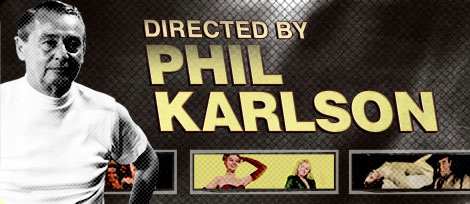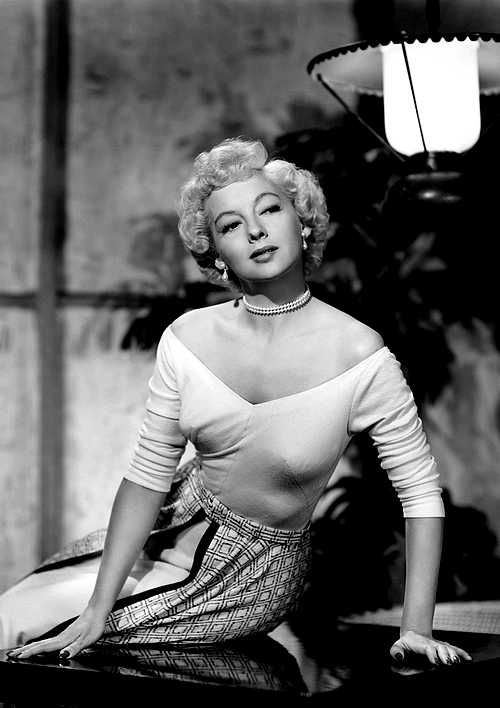Director: Phil Karlson
Writers: Robert Smith (screenplay), George Zuckerman (story), Phil Karlson and John Payne (uncredited)
Starring John Payne, Evelyn Keyes, Brad Dexter, Frank Faylen, Peggy Castle
http://www.youtube.com/watch?v=mG1guwmVPDk
Produced by United Artists in 1953, Phil Karlson’s tough 99 River Street, starring John Payne and Evelyn Keyes, is one of the director’s trio of classic film noir entries, the others being 1952’s Kansas City Confidential and 1955’s The Phoenix City Story. Though never regarded as being in the front rank of the directors of his time Karlson fashioned a resume of solid, edgy B movies notable for their taut scripts, credible acting, visual style and compelling plots with interesting twists and turns that often kept the stories’ outcomes in doubt.
“His movies are remarkable for their endless outlay of scary cheapness in detailing the modern underworld,” noted critic Manny Farber. “Also, Karlson’s work has a chilling documentary exactness and an exciting shot-scattering belligerence.”
Praising the cast as being comprised of “a broad range of B movies actors all who are at the top of their game,” John Greco, writing at Twenty Four Frames, declares 99 River Street to be “one of the most brutal, viciously violent and tough crime films of the early 1950′s, a practically forgotten gem that even upon its initial release came and went into theaters in a flash. In New York, it played for two weeks at the RKO Palace on Broadway, then a week exclusively at the RKO Albee in Brooklyn before being regulated to the bottom half of a twin bill at neighborhood Loew’s theaters throughout the city and then disappeared. From the opening scenes when we see Eddie in what would be his last fight, blood splattered all over his face, to the final brutal fight between Eddie and Vic this film does not hold back its punches. Character actor Jack Lambert plays Mickey, a hard ass enforcer for Christopher, has some of the most violent scenes in the film, including a brutal fist fight with Eddie that ends with blood streaming down Mickey’s face. In a later scene Mickey grills Eddie emphasizing each question with a heavy chop across the back of Eddie’s neck. Then there is the aforementioned final fight scene between Eddie and Vic Rawlins with Eddie, though wounded by a gunshot, brutally landing heavy punches on Vic before being forcefully pulled off by the police.”
Phil Karlson was born in Chicago in 1908, the son of an Irish stage actress. He attended law school in Los Angeles, and began working in the movie industry as a prop man. He moved up to assistant director on several Abbott and Costello films and began making his own films in the 1940s with entries from the Dead End Kids (Live Wires and Bowery Bombshell) and Charlie Chan (Dark Alibi). Despite directing one notable, early Marilyn Monroe film (1948’s Ladies of the Chorus, in which Marilyn sings “Every Baby Needs a Da Da Daddy” and “Anyone Can See I Love You”) he did not make a mark until the 1950s, when he gained attention for a series of very tough, violent film noirs. This run eventually ended, and he went on to make films with Elvis Presley (Kid Galahad, 1962), Dean Martin (as Matt Helm) and Glenn Ford (A Time for Killing) before scoring his biggest hit, the drive-in classic Walking Tall (1973), the south’s version of Dirty Harry telling the story of Buford Pusser, a Southern lawman willing to break the law in order to fight injustice.
Karlson worked three times with John Payne, who studied acting and singing and even wrestled for a bit. He’s one of those guys you might call a “big lug,” and is best known for believing in Kris Kringle and romancing Maureen O’Hara in Miracle on 34th Street. In his later career, he’s best known for his tough guys in lower-budget noirs and Westerns. He eventually became the father-in-law of screenwriter Robert (Chinatown) Towne. According to some sources, Payne and Karlson both contributed to the screenplay for 99 River Street, their second film together. Karlson passed away in 1985, Payne in 1989.
What It’s About
Ernie Driscoll (John Payne) is a washed-up boxer who was on the verge of becoming champ until he injured his eye in the ring. He’s married to the gorgeous Pauline (Peggie Castle), who was hoping for the good life, and now spends her time being angry and disappointed. But she has chosen a way out; her new lover Victor Rawlins (Brad Dexter) is a thief who has just stolen a batch of diamonds and hopes to trade it for enough cash to skip town. Meanwhile, Ernie decides to help a friend, Linda James (Evelyn Keyes), an actress hoping for a break on Broadway. Through a complex series of circumstances and coincidences, the cops are soon hunting Ernie for an assault and battery charge (which is real) and a murder charge (which is false).
The Lure of the Underworld
Usually, a noir hero makes a bad choice that sends him running irrevocably down the wrong road, and it usually has something to do with either money or women. In Ernie’s case, he’s mostly innocent; he never consciously makes a choice to enter the underworld. On the contrary, his dream is to save up enough money to open a gas station! His mistake came years earlier when he confused the adoration of his female fans (like Pauline) for the real thing. (“When I was a kid I thought I’d grow up and meet a girl who’d stick in my corner, no matter what. Then I grew up,” he says.) Pauline betrays him, his career betrays him, and his own brute strength betrays him. When he loses his temper, he has the power to kill, and thus his assault and battery charge could result in some real, hard time.
The Femme Fatale
Many films noir have a “femme fatale” character that is responsible for the hero’s downfall. Neither Pauline nor Linda is a genuine femme fatale. Pauline is sexy and duplicitous, but she does not draw Ernie into her illicit activities. She deliberately seeks not to involve him. Indeed, she’s more a passive victim, allowing her fate to be decided by her new boyfriend. A true femme fatale is mostly in control, seducing and bringing down a man over the course of the film. And even though Linda tricks Ernie with a stunt designed to get her a part in a play, she turns out to have a heart of gold, and eventually risks her own safety to stick by Ernie.
The Look
99 River Street is notable for its frank, brutal violence, which doesn’t stop at images of men smacking around women. Andrew Sarris wrote that one of Karlson’s themes was the outbreak of violence in a world controlled by criminals and the corrupt. The film opens on an absolutely astonishing boxing sequence, close-up, ringside and off-kilter, that Martin Scorsese surely studied before he made Raging Bull. Karlson continues this low-angle violence throughout, and even echoes certain key shots over the course of the film. Many small moments further establish his agenda, such as when Rawlins simultaneously takes a belt of liquor and slugs a man in the jaw. In another scene, Linda plays out a lengthy post-murder scene in panicked close-up, with no cuts or cutaways.
Moral of the Story
A man can start all over again, despite some really bad breaks and some over whelming odds. A dream, a job and a good woman prove there are always possibilities ahead.
(Sources: “Shadows of Noir: 99 River Street,” by Jeffrey M. Anderson at the moviefone blog, May 6, 2010; imdb.com)
SELECTED SHORT SUBJECT: MICKEY’S GRAND OPERA (1936)
http://www.youtube.com/watch?v=iTfS8vaCseU
Richard Wagner’s Prelude to Act III of Lohengrin opens the 1936 Disney cartoon, “Mickey’s Grand Opera,” directed by Wilfred Jackson. Later in the cartoon, Clara Cluck, Donald Duck, Pluto and a frog perform the quartet, “Bella Figlia Dell’Amore,” from Verdi’s Rigoletto.
Mickey is preparing to conduct an opera when he chases Pluto away. Pluto crashes into a magician’s props backstage and spars with the hat, its rabbits, and its doves. The opera begins: Clarabelle plays flute, Clara and Donald are the leads in Romeo and Juliet. Pluto follows the magic hat onstage, to Mickey’s growing annoyance. The hat falls into a tuba, and soon the animals are filling the stage
Voices are Pinto Calvig (Pluto), Walt Disney (Mickey), Florence Gill (Clara Cluck) and Clarence Nash (Donald Duck). Original music is by Leigh Hartline. Animation by Les Clark, Frenchy DeTremaudan, Norman Ferguson, Paul Hopkins, Dick Lundy.







